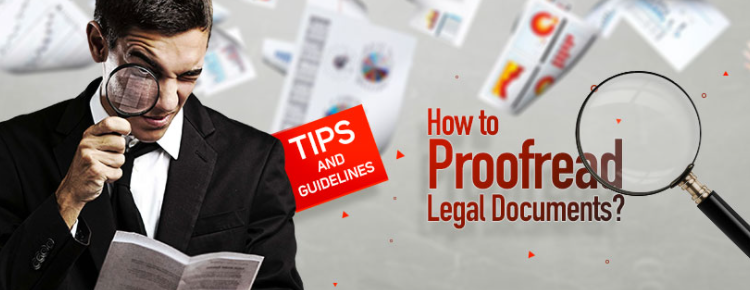
Proofreading and editing is an integral part of drafting a legal document.
In simplest terms, it means checking or reviewing any errors in documents for spelling, grammar, punctuation, typing mistakes, etc. As we know, the devil is in the details, so skimming through every minute detail is of utmost importance to prepare a water-tight case.
How proofreading helps to make a better legal document
Proofreading and editing are refining a document because a single-minute discrepancy may change the meaning and intention of the entire document. In the case of legal documents, an error can lead to legal issues for the client and increase the hurdles in the lawyers’ path. Utmost care is taken while proofreading legal documents to ensure it is well organized. The information is clearly and accurately presented to the parties involved so that there is no confusion. A flawed document doesn’t convey the desired messages. Legal documents are complex, and added errors can only add to the confusion. Hence, the process should be started as soon as the documents have been drafted.
CONTACT TODAY BY CLIECKING HERE FOR PROOFREADING AND EDITING OF YOUR LEGAL DOCUMENTS
How editing helps to make a better legal document
Editing contributes equally to building a solid and error-free legal document. It also gives us a chance to reconstruct and add additional information once we revisit it. It helps in building a stronger case. It has been seen that proofreading improves the quality of work. The process of proofreading legal documents involves spell checking; with advancements in technology, lawyers don’t have to go through the documents word by word as spell checker has made life comparatively easier.

Why human checking and help of technology is important
One cannot completely depend on technology, so one should always be aware. What does it take to win a case? Facts, figures, proper names, and error-free documentation are crucial. So every fact, figure, etc., should be double-checked so that it is accurate and reproducible in the court of law if needed. The formatting of the document is to be double-checked, punctuation, page number, etc., cause even a misplaced comma can be used against or in favour of the client is legally binding documents as it can be interpreted in multiple ways. It changes the entire scenario. Reading a document backward is another technique to identify errors. Instead of being distracted by the meaning of the sentences ample amount of time is contributed to the words on the document.
Take care of headings and subheadings
Precaution is better than cure. When reviewing a hard copy of the document, added precaution needs to be taken. Error in numbering a section or subsection can be detrimental for a case. Hence extra care is required to proofread legal documents. Use of the wrong subsection designator is equally detrimental. Headings and subheadings, the order of presentation of sections and subsections should be thoroughly checked. The case citations need to be presented in a particular style. For utmost accuracy and consistency of the documents, all cross-references should be thoroughly checked. Trying to proofread every element at once can be exhausting, time-consuming, and the outcome is not satisfactory. Hence planning staged proofreading in pieces not only saves time also gives better outcomes. In the case of editing, creating an entire draft after it is done is helpful. On the other hand, editing helps in correcting issues at the core.
Writing style such as sentence construction, use of words that can change the interpretation of the entire document. A lengthy and messy document doesn’t help; editing helps in decreasing the word count and increasing clarity. After the process of self-editing, getting it cross-checked by other colleagues makes the document more refined.
Why error free documents are so crucial in law
Law is the profession of communication, and a faulty document can cost dearly in a court of law. It also leaves an impression that one is not sincere about their job. Proofreading and editing add more power to the work done and reduce the chances of jeopardizing a case. It is a habit that every lawyer should inculcate from the beginning because it is their job to ensure that they do the best for their clients. With the advancement in technology, things have become way more accessible than once, but one shouldn’t blindly depend only on technology.